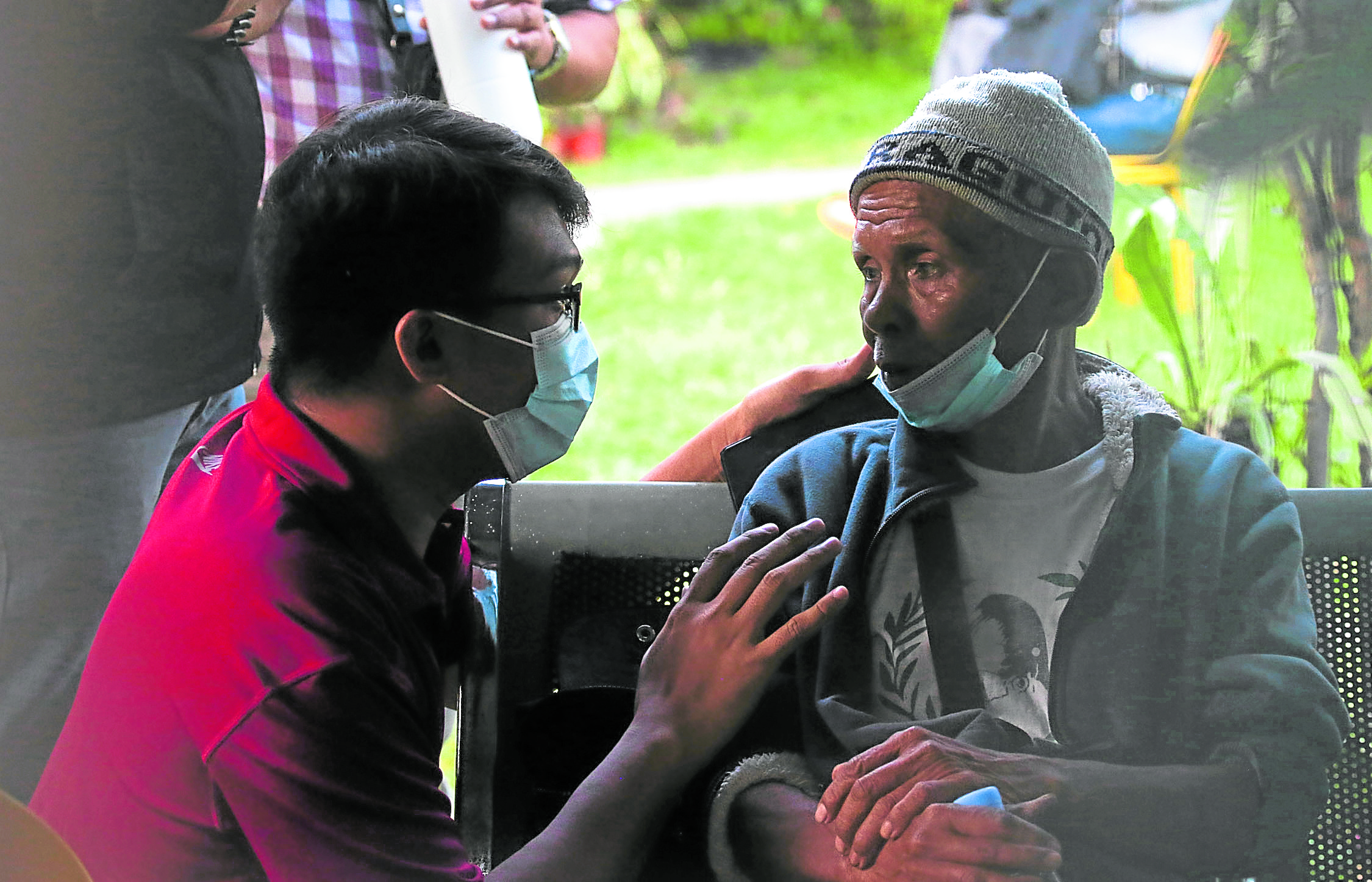Kin of slain activists seek independent autopsy

LOSING A SON Angelito dela Cruz (right), the 74-year-old father of indigenous rights activist Randy dela Cruz, who was killed with his cousin, Puroy dela Cruz, during a police raid on Sunday in Tanay, Rizal, appears forlorn as he listens to a paralegal volunteer at the Antipolo Memorial Home on Thursday while waiting for the authorities to release the body of his son. Seven other activists were killed in Batangas and Cavite during the simultaneous raids. —LYN RILLON
Peace remained elusive even in death for at least four of the nine activists killed in the “Bloody Sunday” raids in the Southern Tagalog region as authorities refused to immediately hand over their remains to their families.
More than 24 hours after their families arrived at the funeral parlor to claim their bodies, the remains of activists Mark Lee Bacasno and Melvin Dasigao, and cousins Randy and Puroy dela Cruz, were finally moved out of the Antipolo Memorial Homes on Thursday night, according to the Southern Tagalog chapter of the human rights group Karapatan.
The families of the slain activists planned to bring their bodies for autopsy at the Philippine General Hospital.
Their bodies had been held behind the padlocked gates of the funeral parlor supposedly at the behest of the provincial police.
Kathy Panguban, a lawyer for the families, said they had been “traumatized and scared” after they were padlocked inside the funeral home for more than 12 hours.
Article continues after this advertisementThe relatives of the four men had already completed the paper work and paid the mortuary fees on Wednesday night but the police refused to release their remains, Panguban said.
Article continues after this advertisementShe said members of the families arrived at the funeral parlor around 7 p.m. on Wednesday night to retrieve the bodies for an independent autopsy under the auspices of the Commission on Human Rights.
Bacasno and Dasigao from Rodriguez town, Rizal province, and the Dela Cruzes from Tanay, also in Rizal, were among the nine killed when the police, carrying warrants to search for firearms and explosives, conducted simultaneous raids across Calabarzon last Sunday.
Police Brig. Gen. Ildebrandi Usana, the PNP spokesperson, said the nine who were killed were members of the New People’s Army who had pretended to be activists.
He said they were killed “when they wanted to shoot it out instead of surrender.”
Rights advocates
Dasigao and Bacasno were members of the San Isidro Kasiglahan, Kapatiran at Damayan para sa Kabuhayan, Katarungan at Kapayapaan (SIKKAD-K3), which advocated housing rights in Rizal.
It’s one of the urban poor alliances Red-tagged by the Philippine National Police and military.
The Dela Cruzes, members of the Dumagat community, were active in an indigenous rights’ group in Sierra Madre.
Shortly after the raids, police transferred their bodies to the PNP-accredited funeral home, which charged each family P25,000 for handling the remains.
When the families attempted to retrieve the bodies on Wednesday night, several police and soldiers refused to acknowledge their documents, including death certificates and receipts for payments, Panguban said.
The police explained to the families that Rodriguez Mayor Tom Hernandez and Tanay Mayor Rex Tanjuatco promised to assist them. Later they told the families that the funeral parlor would “take care of everything.”
But this was against the wishes of the families to have the bodies autopsied and then given a decent burial, Panguban said.
At around 1 a.m. on Thursday, paralegals who accompanied the families said a fire truck along with two military trucks, three police cars and motorcycles arrived, blocking vehicular access to the funeral home.
More than 20 Philippine Army soldiers led by a certain “Captain Bauya” also appeared, they said.
Then the gates of the funeral home were locked, preventing the members of the families from leaving and their lawyers and other supporters from entering it.
Panguban said the police also threatened to arrest the grieving families for trying to take videos of the incident.
“This was wrong, very wrong,” she said. “First they talked to the families without their counsels, and then they threatened to arrest them. They are already grieving, and yet the police chose to make them suffer more.”
‘Hostage-taking’
In a statement, several rights groups denounced the “barbaric, inhumane … hostage-taking” of the bodies by the police and the military, which they said was a common practice especially in the retrieval of remains of victims in antidrug operations, vigilante-style executions and suspected political killings.
Often, Panguban said police would hold the bodies simply to give the families the runaround—a final insult after a brutal death—or to prevent them from pursuing independent action, such as autopsies.
Anakpawis chair Ariel Casilao said the hostaging of the remains were a clear violation of international humanitarian law.
Karapatan secretary general Cristina Palabay the families of the slain activists were “victimized twice over” when the authorities refused to allow them to retrieve the remains.
Usana blamed Karapatan and other groups for the delay in the release of the bodies.
The Rizal police chief reported that members of Karapatan wanted to enter the funeral parlor “without due notice,” he said.
Usana said the funeral parlor wanted only the relatives to get in but Karapatan members wanted to join them, “which could not be possible in view of the possible violations of minimum health and safety standards.”